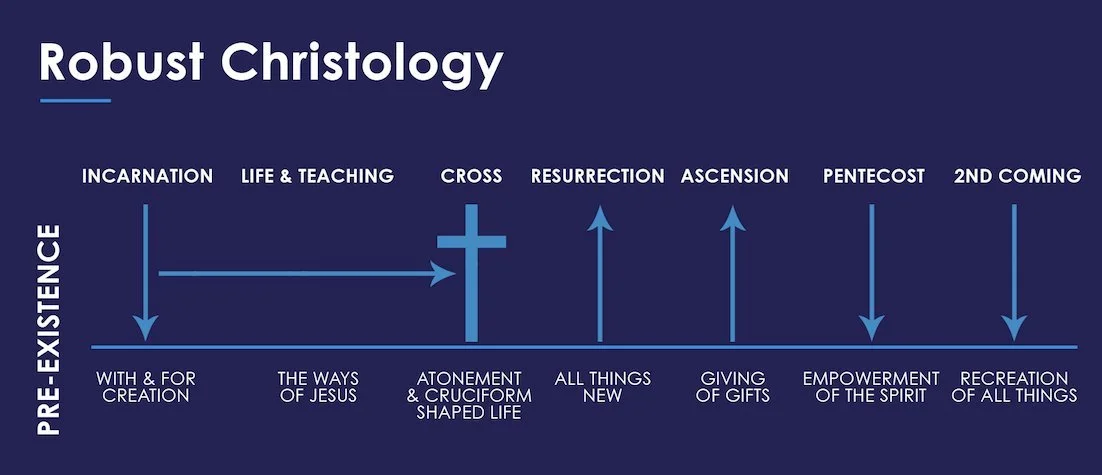We need a new overstory when it comes to the way we understand evangelism and discipleship. In most church settings, people think of evangelism as something you do with lost people, while discipleship is for those who have already decided to follow Jesus.
Navigating a Post-Christendom World
The difficulty the church is experiencing today in relating to the current culture is in large part due to our Christendom heritage. Many in the church today still believe Christianity is in a place of influence and significance.
The Scandal of the Evangelical Gospel
If evangelicalism is to regain its credibility, it must expand its gospel beyond individual salvation. The gospel of the Kingdom is far more compelling, transformative, and biblical than the shrunk-down gospel of “pray this prayer and get to heaven.”
Bounded Set vs. Centered Set
In a centered-set approach, the church would prioritize the direction people are moving in their relationship with Jesus rather than whether they have achieved a particular level of belief or behavior.
Recapturing the Missionary Nature of the Church
The church doesn’t just SEND missionaries, the church IS the missionary.
Robust Christology
By embracing a broader, more robust view of Christology, it will lead to a more fully informed missiology. What I am calling a "Jesus Shaped Missiology." This type of missiology aims to equip churches with a richer, more dynamic understanding of Jesus, which in turn inspires a more active and contextually engaged mission in the world.
10 Crucial Cultural Shifts
How can we help the church recognize the urgent need to rethink its approach to church, mission, discipleship, evangelism, and church planting? A crucial step is to bring attention to the significant changes occurring outside the church.
Rethinking Preaching: Limitations and Alternatives for Transformational Learning
Preaching has long been central to Christian worship. While it plays an important role in conveying biblical truths and inspiring congregations, it is limited when used as the primary means of learning in the church.
Reflections From an Old(er) Guy
One of the most enlightening things that I have learned over the years, is that deep, genuine, transformative change almost never happens without some type of crisis or suffering.
12 Possible Covocational Marketplace Callings
The right marketplace vocation for a Covo planter should allow flexibility, align with the planter's skills, and complement their church planting strategy. Here are several vocations that could be a good fit.
Why Self-Awareness Matters: Tackling the Ego
Understanding our true self, false self, and shadow self has roots in many different philosophies and psychological theories, but it’s not hard to see how these concepts have profound implications for the way we live out our faith and identity as followers of Jesus.
Stages of Spiritual Development
I find stages of development to be extremely helpful, not only to better understand my own personal growth, but I think it can be helpful when recognizing where others are in their spiritual journey. Hope there is something here that is helpful.
What is the Difference Between Bivo and Covo?
A Covocational Church Planter is one whose primary vocation is in the marketplace and at the same time is called to start a church. A “covo” planter has a clear calling in the marketplace that they never intend to leave. They know God has called them to be a teacher, mechanic, graphic designer or doctor and they desire to weave that calling into the plan to plant a church.
Church Multiplication and Movement
All of the potential for movement is already present in God’s people; our job as church leaders is to bring it out. In a movement church, everyone gets to play! No one sits on the bench.
5 Razones para Ser Covocacional
La plantación covocacional ayuda a disminuir la división entre lo sagrado y lo secular en lo que respecta a la vocación. La congregación puede ver al plantador de la iglesia modelando el hecho de que todo trabajo importa.
Repensando la Plantación de Iglesias Bivocacional
Hoy en día hay un nuevo movimiento entre líderes bivocacionales. Más plantadores de iglesias están eligiendo plantar de manera bivocacional. Están tomando esta decisión en base a la convicción de que la plantación de iglesias bivocacional provee una manera más deseable de plantar una iglesia que en base a fondos limitados.
Microchurches
All microchurches will not (and should not) look alike. Mission is the mother of adaptive ecclesiology. This simply means that if we begin with God’s mission (missiology) there ought to be lots of wild and wonderful expressions of church (ecclesiology).
APEST "Thinking Hat" Exercise
With the Six Thinking Hats concept in mind, consider using APEST as a lens to systematically examine a problem from various angles, fostering a more comprehensive and balanced decision-making and problem-solving process. Use each of the APEST gifts to represent a particular hat that focuses the group’s thinking and conversation.
Mission As The Organizing Principle of the Church
I am convinced that many denominations (and churches) want to shape mission to fit their polity and existing structure, rather than shape polity and structure around mission.
What is Dualism and Why Does It Matter?
I have had people ask me lately about the meaning of non-duality or dualistic thinking. I am convinced it is at the core of several problematic issues, in our own lives, but especially within religion and American politics.



















